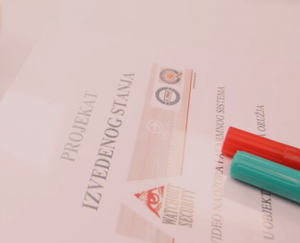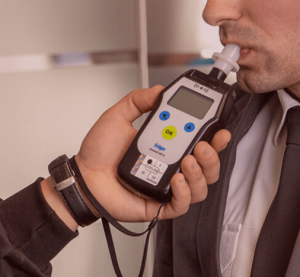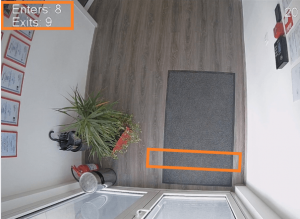Rules of Procedure
Pursuant to Article 1, paragraph 2 and Article 3, paragraphs 2 and 6 of the Labor Law (“Official Gazette of RS”, No. 24/05, 61/05, 54/09, 32/13 and 75/14) , for „Watchout Security doo Kragujevac “, director Milutin Jacimovic on November 13, 2019. brings:
RULES OF PROCEDURE
AND GENERAL PROVISIONS
Article 1.
This rulebook regulates the rights, obligations and responsibilities from the employment of employees in “Watchout Security d.o.o. Kragujevac ”, as an employer (hereinafter: the employer), in accordance with the Labor Law and special laws (hereinafter: the law).
In the event that certain provisions of this Rulebook determine smaller rights or more unfavorable working conditions than the rights and conditions determined by law, the law shall apply directly.
The law directly applies to rights and obligations that are not determined by this Rulebook.
The provisions of this Ordinance apply to employees who work on the territory of the Republic of Serbia, with a domestic or foreign legal entity or natural person, as well as to employees who are sent to work abroad by the employer. More detailed conditions for sending employees to work abroad are defined by the Rulebook on sending employees to work abroad.
The rights, obligations and responsibilities of the employee are decided by the director or the employee when he authorizes.
II BASIC RIGHTS AND OBLIGATIONS OF EMPLOYEES AND EMPLOYERS
1) Employee rights
Article 2
The employee has, in accordance with the law and this rulebook, the right to:
- adequate earnings;
- Safety and Health at Work;
- health care, protection of personal integrity, dignity of the person and other rights in case of illness, reduction or loss of working ability and old age;
- material security during temporary unemployment;
- protection from harassment at work;
- the right to other forms of protection in accordance with the law and this Rulebook.
- The employee has the right to special protection for the purpose of child care, and the employed woman also has the right to special protection during pregnancy and childbirth, in accordance with the law.
Employees under the age of 18 and an employed person with a disability are entitled to special protection in accordance with the law and this Rulebook.
If an employee is hired or assigned under special conditions – a person with a disability – the employer must adjust the job, or both the job and the job. The adjustment of work means the adjustment of the work process and work tasks, while the adjustment of the workplace means the technical and technological equipment of the workplace, means of work, space and equipment – in accordance with the capabilities and needs of persons with disabilities.
Depending on whether there is a difference in the type of work performed by the employee before the assessment of working ability and the work he can perform after the assessment of working ability, and the conditions required for the work he can perform after the assessment, the Rulebook on organization will be amended. and systematization of jobs and employment contracts.
Article 3
Employees directly, ie through their representatives, have the right to associate, participate in negotiations for concluding a collective agreement, peacefully resolve collective and individual labor disputes, consult, inform and express their views on important issues in the field of work.
Article 4
An employee’s contract or a decision of the director may determine the employee’s share in the profit realized in the business year, in accordance with the law and the founding act of the employer.
The amount of the employee’s share in the realized profit is decided by the assembly of the employer on the basis of the employee’s contribution to the realized profit, at the written proposal of the director.
2) Obligations of employees
Article 5
The employee is obliged to:
- to conscientiously and responsibly perform the work on which he works;
- to respect the organization of work and business, as well as the conditions and rules of the employer regarding the fulfillment of contractual and other obligations from the employment relationship;
- to inform the employer of significant circumstances that affect or could affect the performance of work specified in the employment contract;
- to inform the employer of any kind of potential danger to life and health and the occurrence of material damage;
- to be professionally trained and trained according to the decisions of the director.
3) Obligations of the employer
Article 6
The employer is obliged to:
- provide the employee with the performance of tasks determined by the employment contract;
- provide working conditions to the employee and organize work, safety and protection of life and health at work, in accordance with the law and other regulations;
- pays the employee a salary for the work performed, in accordance with the law, this rulebook and the employment contract;
- provide the employee with information on working conditions, work organization, rules referred to in Article 5, item 2) of this Rulebook, regulations on safety and protection of life and health at work, as well as regulations prohibiting harassment at work;
- in cases determined by law, ask for the opinion of the trade union, and with the employer when the trade union is not formed from the representative appointed by the employees;
- organizes work in a way that prevents the occurrence of harassment at work and in connection with work by the director, ie the responsible person or employees;
- organizes and implements
- de ban on smoking in work premises in accordance with the law.
Article 7
The director is obliged to:
- organizes work in a way that prevents the occurrence of abuse and provides employees with working conditions in which they will not be exposed to abuse by the employer, or the responsible person or employees of the employer;
- in order to identify, prevent and prevent abuse, implement measures to inform and train employees and their representatives to recognize the causes, forms and consequences of abuse;
- before starting work, provide the employee with a notice on the prohibition of abuse and the rights, obligations and responsibilities of the employee and the employer in connection with the prohibition of abuse.
Article 8
The employee is obliged to:
- refrain from conduct that constitutes abuse and conduct that constitutes an abuse of the right to protection from abuse;
- responds to the call of the employer to be informed, informed and trained in order to recognize and prevent abuse and abuse of the right to protection from abuse.
Article 9
The Director may designate a support person to whom an employee suspected of being exposed to abuse may turn for advice and support.
The support person should have developed organizational and analytical skills, responsibility, accuracy and reliability, communication and tact in interpersonal relationships as well as the ability to cooperate.
The support person should advise and suggest possible directions for further action and explain the roles of persons who are legally involved in the procedure for protection against abuse and cases in which it is not necessary to initiate the mediation procedure.
Article 10
A request for protection against abuse is submitted to the director.
The director is obliged, within three days from the day of receipt of the request for protection against abuse, to propose mediation to the parties to the dispute as a way of resolving the disputed relationship and to propose to choose a person from the list of mediators kept by the Republic Agency for Peaceful Settlement. to propose a mediator for a specific case.
The person proposed for the mediator should have appropriate education, communication and openness, good knowledge of the situation and problems with the employer, high moral qualities – incorruptibility, impartiality, objectivity, reputation and trust that he enjoys in his work environment.
If the mediator is from the ranks of employees, mediation activities are performed within the regular working hours, and the director is obliged to redistribute the regular activities of the mediator.
Article 11
The procedure for protection against abuse is conducted in accordance with the law.
III ESTABLISHMENT OF EMPLOYMENT
1) Conditions for employment
Article 12
The employer may establish an employment relationship with a person who is at least 15 years old and who meets the condition of psychophysical and health ability, as well as special conditions for work on certain jobs, determined by law, ie the rulebook on organization and systematization of jobs.
The employer may also establish an employment relationship with a person who has a determined status of a person with a disability, in accordance with the law governing professional rehabilitation and employment of persons with disabilities.
An employer may establish an employment relationship with a person under the age of 18 only with the written consent of a parent, adoptive parent or guardian, if such work does not endanger his health, morals and education, or if such work is not prohibited by law.
A person under the age of 18 may enter into an employment relationship only on the basis of a finding of the competent health authority which determines that he is capable of performing the work for which he is employed and that such work is not harmful to his health.
Article 13
The candidate is obliged, when establishing an employment relationship, to submit to the employer documents and other evidence of fulfillment of conditions for work on the jobs for which he is employed, determined by the Rulebook on organization and systematization of jobs.
Article 14
Before concluding the employment contract, the employer is obliged to inform the candidate about the job, working conditions, rights and obligations from the employment relationship and the rules from Article 5, item 2) of this Rulebook.
The employer is obliged to inform the employee in writing, before starting work, about the prohibition of harassment at work and the rights, obligations and responsibilities of the employee and the employer in connection with the prohibition of harassment, in accordance with the law.
2) Employment contract
Article 15
The employment relationship is based on an employment contract.
The employment contract is concluded between the employee and the employer.
The employment contract is considered concluded when it is signed by the employee and the director, or a person authorized by him.
The employment contract is concluded in three copies, one of which is handed over to the employee, and two are kept by the employer.
Article 16
The employment contract is concluded before the employee starts work, in writing.
If the employer does not conclude an employment contract with the employee in accordance with paragraph 1 of this Article, it is considered that the employee has established an employment relationship for an indefinite period of time on the day of starting work.
Article 17
The employment contract contains:
- name and seat of the employer;
- personal name of the employee, place of residence, ie residence of the employee;
- the type and level of education, ie education of the employee, which are a condition for performing the work for which the employment contract is concluded;
- name and description of the job that the employee should perform;
- place of work;
- type of employment (indefinite or fixed-term);
- the duration of the fixed-term employment contract and the basis for establishing a fixed-term employment relationship;
- day of work start;
- working hours (full-time, part-time or part-time);
- monetary amount of basic salary on the day of concluding the employment contract;
- elements for determining the basic salary, work performance, salary compensation, increased salary and other employee income (if not determined by this Rulebook);
- deadlines for payment of wages and other benefits to which the employee is entitled (if not determined by this Ordinance);
- duration of daily and weekly working hours (if they are not determined by this Rulebook);
- reasons for making a decision on the introduction of the minimum wage;
Other rights and obligations may be agreed upon in the employment contract.
The relevant provisions of the law and this Rulebook shall apply to rights and obligations that are not determined by the employment contract.
3) Employment for an indefinite and definite period of time
Article 18
Depending on the needs of the work process with the employer, the employment relationship can be based on an indefinite or definite period of time.
Article 19
An employment contract may be concluded for a definite period of time, for the establishment of an employment relationship whose duration is determined in advance by objective reasons that are justified by the deadline or the execution of a certain job or the occurrence of a certain event during those needs.
The employer may conclude one or more employment contracts referred to in paragraph 1 of this Article, on the basis of which the employment relationship with the same employee is established for a period that cannot be longer than 24 months with or without interruptions.
A fixed-term employment contract may be concluded, and:
- if necessary due to the replacement of a temporarily absent employee, until his return;
- for work on a project whose time is predetermined, no later than the end of the project;
- with a foreign citizen, on the basis of a work permit in accordance with the law, no later than the expiration of the term for which the permit was issued;
- for work with a newly established employer whose entry in the register with the competent authority at the time of concluding the employment contract is not older than one year, for a period whose total duration does not exceed 36 months;
- with an unemployed person who lacks up to five years until the fulfillment of one of the conditions for exercising the right to an old-age pension, the longest until the fulfillment of the conditions, in accordance with the regulations on pension and disability insurance.
The employer may conclude a new employment contract with the same employee for a definite period of time after the expiration of the deadline referred to in paragraph 3, item. 1-3) of this Article on the same, ie other legal basis, in accordance with this Article.
If the fixed-term employment contract is concluded contrary to the provisions of this Rulebook or if the employee remains working for at least five working days after the expiration of the time for which the contract was concluded, it is considered that the employment is based on indefinite time.
4) Full-time and part-time employment
Article 20
Employment is based, as a rule, on a full-time basis.
An employment relationship may also be established for part-time work, in the case when the Rulebook on the organization and systematization of work is such that the scope of work is such that it does not require full-time employment;
An employee who works part-time has all the rights from the employment relationship in proportion to the time spent at work, unless otherwise determined by law, this rulebook and the employment contract for certain rights.
5) Employment for performing work outside the premises of the employer
Article 21
An employment relationship may be established to perform work outside the employer’s premises, which includes teleworking and working from home.
The employer is obliged to provide working conditions, means of work and compensation of other costs arising from the work to the employee who performs work from home, as well as to determine the manner of performing supervision over the work of the employee.
The employment contract concluded in terms of paragraph 1 of this Article, in addition to the provisions of Article 17 of this Rulebook, also contains:
- duration of working hours according to work norms;
- the manner of supervising the work and the quality of the employee’s work;
- means of work for the performance of work that the employer is obliged to procure, install and maintain;
- use and utilization of funds for the work of the employee and reimbursement of costs for their use;
- compensation of other labor costs and the manner of their determination;
- other rights and obligations.
Even when the employment contract does not establish an employment relationship for performing work outside the employer’s premises in terms of paragraphs 1 and 2 of this Article, the employee may, with the approval of the director, at the proposal of the immediate supervisor, perform work outside the employer’s premises.
6) Trial work
Article 22
An employment contract may contract trial work for the performance of one or more related or related tasks determined by the contract.
thief about work.
The trial period may last for a maximum of six months.
The employer or the employee may terminate the employment contract even before the expiration of the time for which the probationary period has been agreed, with a notice period that cannot be shorter than five working days.
In case of termination of the employment contract in terms of paragraph 3 of this Article by the employer, the employer is obliged to explain the termination of the employment contract.
An employee who did not show adequate working and professional abilities during the probationary period shall have his / her employment terminated on the day of the expiration of the term determined by the employment contract.
The evaluation of the work and professional abilities of the employee is given by the director.
7) Trainees
Article 23
Employment in the capacity of trainee is established with a person who first establishes employment, in the capacity of trainee, for the occupation for which that person has acquired a certain type and level of education, if it is determined by law and regulations on work organization and systematization of work.
The internship lasts a maximum of one year, unless otherwise provided by law.
During the internship, the intern has the right to salary and all other rights from
employment relationship, in accordance with the law, this rulebook and the employment contract.
The employment contract with the intern is concluded for a definite period of time and contains provisions on the duration of the internship and the obligation to take the internship exam.
The trainee performs an internship and takes the internship exam according to the program, which is brought by the employer.
The trainee takes the trainee exam before a three-member commission appointed by the employer and whose members must have at least the same level of education as the trainee who takes the exam.
An intern who does not pass the internship exam loses his employment with the employer.
8) Volunteer work
Article 24
The director may, in accordance with the law, be the organizer of volunteering, but no employment contract is concluded with the volunteers, since volunteer work does not provide rights, responsibilities and obligations from the employment relationship.
IV AGREEMENT ON THE RIGHTS AND OBLIGATIONS OF THE DIRECTOR
Article 25
The director may establish an employment relationship for an indefinite or definite period of time.
The employment relationship is based on an employment contract concluded by the director and the body determined by the founding act.
A fixed-term employment relationship may last until the expiration of the term for which the director was elected, ie until his dismissal.
Mutual rights, obligations and responsibilities of the director who did not establish an employment relationship and the employer are regulated by the contract.
The person performing the duties of the director referred to in paragraph 4 of this Article has the right to remuneration for work and other rights, obligations and responsibilities in accordance with the contract.
V EDUCATION, PROFESSIONAL TRAINING AND TRAINING
Article 26
The employee has the right and duty to be educated, professionally trained and advanced during the work when required by the needs of the work process and the introduction of a new way and organization of work, in accordance with the decision of the director.
The costs of education, professional training and advanced training, such as: costs of enrollment, tuition, exams, textbooks and other professional literature, as well as other costs, are provided from the employer’s funds, in the amount determined by the director’s decision. The employer and the employee conclude an annex to the employment contract which further defines the rights and obligations based on education, professional training and advanced training.
In the event that the employee terminates education, professional training or advanced training, he is obliged to reimburse the employer for the costs, unless he did so for justified reasons.
VI WORKING HOURS
1) Full and part time
Article 27
Full time is 40 hours per week. Daily working hours are 8 hours.
Part-time work is working time shorter than full-time work.
2) Overtime
Article 28
At the request of the employer, the employee is obliged to work longer than full time in case of force majeure, sudden increase in workload and in other cases when it is necessary to complete an unplanned job within a certain period (hereinafter: overtime).
Overtime may not exceed eight hours per week.
An employee may not work more than 12 hours a day, including overtime.
3) Schedule of working hours
Article 29
The working week lasts five working days.
The schedule of working hours within the working week is determined by the employer in a written decision.
The working day, as a rule, lasts eight hours.
Article 30
The employer may organize the working week and the schedule of working hours in another way when the nature of the work and the organization of work so require.
The employer is obliged to inform the employee about the schedule and change of the work schedule at least five days before the change of the work schedule, except in the case of the introduction of overtime work.
Exceptionally, the employer may notify the employee of the schedule and change the schedule of working hours within a period of less than five days, but not less than 48 hours in advance, in case of need of work due to unforeseen circumstances.
4) Redistribution of working time
Article 31
The employer may redistribute working hours when required
the nature of the activity, the organization of work, better use of means of work, more rational use of working time and the execution of certain work within the established deadlines.
The redistribution of working time is done so that the total working time of the employee in the period of six months during the calendar year is on average not longer than the agreed working time of the employee.
The Rulebook on Labor, as in the employment contract, stipulates that the redistribution of working hours is not tied to a calendar year, ie that it can last longer than six months and a maximum of 9 months.
An employee who has agreed to work in the redistribution of working hours on average longer than the time specified in paragraph two of this Article, working hours longer than the average working hours of the employee shall be calculated and paid as overtime work.
In case of redistribution of working hours, working hours may not last longer than 60 hours per week.
Article 32
Redistribution of working time is not considered overtime.
5) Night work and work in shifts
Article 33
Due to the needs of the work process, the employer can introduce night work and work in shifts, in accordance with the law.
For work at workplaces, which imply that due to the nature of the employer’s activity or the need for work, it is also performed at night, this criterion is evaluated as a special working condition when determining the basic salary. As night work is valued as an element of basic salary, the employee is not entitled to increased salary for work performed on that basis.
The employee is not entitled to an increase in salary based on shift work.
VII VACATIONS AND LEAVE
1) Rest during daily work
Article 34
An employee who works at least six hours a day has the right to rest during daily work for 30 minutes.
An employee who works longer than four hours and less than six hours a day is entitled to a 15-minute break during work.
An employee who works more than 10 hours a day is entitled to a 45-minute break during work.
Rest during daily work cannot be used at the beginning and end of working hours.
Rest time from paragraphs 1-3. of this article is included in working hours.
Article 35
Rest during daily work is organized in a way that ensures that work is not interrupted, if the nature of work does not allow interruption of work, as well as if you work with clients.
The decision on the schedule of using the rest during the daily work is made by the employer.
2) Daily rest
Article 36
The employee has the right to rest between two consecutive working days for at least 12 hours continuously within 24 hours, unless otherwise provided by law.
3) Weekly rest
Article 37
The employee has the right to a weekly rest period of at least 24 hours continuously, to which is added the time of daily rest referred to in Article 36 of this Rulebook.
Sunday rest, as a rule, is used on Sundays.
The employer may set another day for the use of the weekly rest if the nature of the work and the organization of work so require.
If it is necessary for the employee to work on the day of his / her weekly vacation, the employer is obliged to provide him / her with a vacation of at least 24 hours continuously during the following week.
4) Vacation
Article 38
In each calendar year, the employee is entitled to an annual leave of 20 working days, provided that this legal minimum is increased on the basis of the following criteria:
- contribution at work:
- to an employee who has achieved work results above the standard performance – 1 working day
- Work conditions:
- work on jobs with increased risk – 1 working day
- Work experience:
- over 30 years of work experience – 1 working day
- persons with disabilities – 1 working day.
The length of annual leave is determined by the employer by applying the stated criteria.
A special decision determines the number of days of annual leave to which the employee is entitled each year by applying the above criteria.
Article 39
The employee acquires the right to use the annual leave in a calendar year after a month of uninterrupted work from the day of establishing employment with the employer.
An employee is entitled to a proportional part of annual leave (twelve years of annual leave determined in accordance with the criteria from Article 38 of this Rulebook) for one month of work in the calendar year in which he started employment or in which his employment was terminated.
Article 40
The employer decides on the schedule for the use of annual leave with the employer, depending on the needs of the job, with prior consultation of the employee and in accordance with the plan for the use of annual leave submitted by the immediate managers of organizational units.
The immediate supervisor shall submit to the director by the end of May of the current year a plan for the use of the first part of the annual leave for at least two working weeks continuously, and by the end of December of the current year a plan for the use of the second part or more of the annual leave. provide certain jobs with appropriate replacement, ie uninterrupted functioning of the work process.
The decision on the use of annual leave is delivered to the employee no later than 15 days before the date set for the beginning of the use of annual leave.
must, and in the case of using annual leave at the request of the employee, the decision is delivered immediately before the use of annual leave.
The employee can use the annual leave in one part or in two parts, provided that the first part lasts for two working weeks continuously in the current calendar year, and the second part no later than June 30 of the following year.
The Employee and the Employer may agree that the employee shall use the annual leave in several parts.
The employer may change the time set for the use of annual leave if the needs of the job so require, no later than five working days before the day set for the use of annual leave.
5) Leave with salary compensation (paid leave)
Article 41
The employee has the right to leave from work with salary compensation (paid leave) for a total duration of up to five working days during the calendar year, in the case of:
- marriage – 2 working days,
- birth of a wife – 3 working days,
- severe illness of a close family member – 3 working days,
In addition to the right to leave referred to in paragraph 1 of this Article, the employee has the right to paid absence yet:
- 5 working days due to the death of a close family member,
- 2 consecutive days for each case of voluntary blood donation, including the day of blood donation,
- 2 days during the professional rehabilitation of persons with disabilities.
The members of the immediate family in the sense of paragraphs 1 and 2 of this Article are considered to be: spouse, children, brothers, sisters, parents, adoptive parent, adoptee and guardian.
The employee exercises the right to leave with salary compensation in the cases referred to in para. 1 and 2 of this Article on the basis of the submitted request and attached evidence.
6. Unpaid leave and suspension of employment
Article 42
The employer may grant the employee leave without salary compensation (unpaid leave), and only if, based on a duly submitted request of the employee, he assesses that the case for which the employee requests unpaid leave is justified, and that the employee’s leave will not disrupt the work process. The employer has the right to, in accordance with the needs of the job, reject the employee’s request; grant unpaid leave for the period specified in the employee’s request or for a shorter period of time than requested.
During unpaid leave, the employee’s rights and obligations arising from the employment relationship are suspended, unless otherwise provided by law, this Ordinance or the employment contract for certain rights and obligations.
The employee’s rights and obligations acquired at work and on the basis of work are suspended under the conditions and in cases of suspension of employment prescribed by law.
VIII EARNINGS, SALARY COMPENSATION AND OTHER INCOME
1) Earnings
Article 43
The employee has the right to an appropriate salary, which is determined in accordance with the law, this rulebook and the employment contract.
Employees are guaranteed the same salary for the same work or work of the same value that they earn with the employer.
Work of equal value means work for which the same level of education is required, ie education, knowledge and abilities, in which the same work contribution has been achieved with equal responsibility.
Basic salary is determined on the basis of job complexity, level of education and other conditions determined by the Rulebook on internal organization and systematization of jobs and time spent at work.
The basis of salary is determined in a monthly amount of money and contains the complexity of work, responsibility, working conditions and education, which is a condition for working on certain jobs and it is stated as Annex no. 1 of this Ordinance.
Article 44
Earnings consist of:
salaries for work performed and time spent at work,
earnings based on the employee’s contribution to the employer’s business success (rewards, bonuses, etc.) i
other incomes on the basis of employment, in accordance with this Ordinance, employment contract and Ordinance on job systematization.
Salary in the sense of paragraph 1 of this Article is considered a salary that includes taxes and contributions paid from the salary.
Wages in the sense of paragraph 1 of this Article are considered all income from employment, except for income from Article 4, Article 21, paragraph 3, items 4) and 5), Article 56, paragraph 1, items 1) – 4), Article 58, Article 59, items 1) and 2) and Article 83 of this Rulebook.
2) Earnings for work performed and time spent at work
Article 45
Salary for work performed and time spent at work consists of basic – contracted salary, part of salary for work performance and increased salary.
Article 46
The agreed salary is the monetary value of the work of a specific job for full-time work and the achieved standard work performance.
The agreed salary is determined on the basis of the conditions determined by the Rulebook on organization and systematization of jobs required for work on jobs for which the employee has concluded an employment contract (education for specific jobs, complexity and responsibility of jobs, technical, technological and other specific conditions) and time spent at work.
Standard work performance implies, in terms of quality, scope and efficiency, appropriate performance of work determined by the rulebook on organization and systematization of work with the employer, for the performance of which the employee has established an employment relationship, for full-time work.
Employees at work
In places where, due to the nature of the employer’s activities, it is performed at night, this criterion is evaluated as a special working condition in determining the basic salary. As this criterion is evaluated through the basic salary, the employee is not entitled to an increased salary on this basis. He is employed and has no right to increase salaries based on shift work.
Article 47
The contracted salary determined on the basis of Article 46 of this Rulebook may be adjusted every month by the performance criterion.
Work performance is determined on the basis of the quality and scope of work performed, as well as the employee’s attitude towards work obligations.
The elements for the calculation and payment of work performance are:
- quality of work performed,
- performing tasks within the set deadlines,
- financial effect of the work performed,
- contribution to teamwork
– the scope of execution of the planned turnover or realization or work plan;
– achieved quality and scope of work of the employee;
– presence at work and attitude towards work, working hours, means of work, work discipline;
– personal initiative in decision making and work organization;
– attitude towards clients and other employees
The achieved work performance with the employer on the basis of the elements referred to in paragraph 3 of this Article shall be determined monthly by the director or a person authorized by him, at the proposal of the immediate manager.
For an employee who, on the basis of the elements referred to in paragraph 3 of this Article, achieves a higher work performance than the standard one, the contracted salary may be increased in proportion to the work performance.
Article 48
The employee has the right to an increased salary in the amount determined by this rulebook and the employment contract, in accordance with the law.
The basis for the calculation of the increased salary is the agreed salary determined in accordance with the law, this rulebook and the employment contract.
Article 49
The trainee is entitled to a salary of at least 80% of the basic salary for jobs for which he has concluded an employment contract, as well as to compensation of expenses and other income, in accordance with this Rulebook and the employment contract.
Article 50
Salary is paid once a month, and no later than the end of the current month for the previous month.
Earnings are paid in cash.
3) Minimum wage
Article 51
An employee is entitled to a minimum wage for standard performance and time spent at work.
The minimum wage is determined on the basis of the minimum wage determined in accordance with the law, time spent at work and taxes and contributions paid from wages, and after the decision of the employer on the introduction of the minimum wage.
The employer makes a decision on the payment of the minimum wage if:
– there are business disturbances,
– due to the difficult business and financial situation which results in a lack of work,
– if it is obvious that the Employer cannot maintain wages at the agreed level,
The decision on the payment of the minimum wage applies to all employees of the Employer.
4) Earnings compensation
Article 52
The employee is entitled to salary compensation in the amount of the average salary in the previous 12 months, in accordance with this rulebook and the employment contract, as follows:
- during absence from work on a public holiday which is a non-working day,
- vacation,
- paid leave,
- military exercises and
- responding to a call from a state body.
Article 53
An employee is entitled to salary compensation during absence from work due to temporary incapacity for work for up to 30 days, as follows:
- in the amount of 65% of the average salary in the previous 12 months before the month in which the temporary incapacity for work occurred, provided that it cannot be lower than the minimum wage determined in accordance with the law and this Rulebook, if the incapacity for work is caused by illness or injury labor, unless otherwise provided by law;
- in the amount of 100% of the average salary in the previous 12 months before the month in which the temporary incapacity for work occurred, provided that it cannot be lower than the minimum wage determined in accordance with the law and this Rulebook, if the incapacity for work is caused by injury at work or occupational disease, unless otherwise provided by law.
Article 54
The employee is entitled to salary compensation in the amount of 60% of the average salary in the previous 12 months, provided that it cannot be less than the minimum wage determined in accordance with the law and this Rulebook, during work interruptions, ie reduction of workload without guilt of the employee, for a maximum of 45 working days in a calendar year.
Exceptionally, in case of interruption of work, ie reduction of the scope of work that requires longer leave, the employer may, after fulfilling the conditions established by law, send the employee on leave for more than 45 working days, with salary compensation referred to in paragraph 1 of this Article.
Article 55
The employee is entitled to salary compensation in the amount of 60% of the average salary determined in accordance with this Rulebook and the employment contract during the interruption of work which was ordered by the competent state body or the employer’s employer due to failure to ensure safety and protection of life and health at work. are a condition for further performance of work without endangering the life and health of employees and other persons, and in other cases, in accordance with the law.
5) Reimbursement of costs
Article 56
The employee is entitled to reimbursement of expenses in accordance with this rulebook and employment contract, as follows:
- for arrival and departure from work, in the amount of the price of the subscription ticket in public transport, with the obligation of the employee to document the costs of arrival and departure from work
- during the time spent on a business trip in the country, in case the transport, accommodation and meals are not organized by the employer, in the amount of:
- travel expenses, according to the attached invoices, ie transportation costs by own car, according to the calculation of kilometers traveled,
- the cost of a night in a hotel with a maximum of 4 (four) stars;
- for time spent on a business trip abroad, in accordance with the decision of the employer
- accommodation and meals for work and stay in the field, if accommodation and meals are not provided free of charge;
- for food during work, in the amount determined by the employment contract;
- for recourse for the use of annual leave, in the amount determined by the employment contract.
The employee is obliged to submit the calculation of expenses from the business trip in the country and abroad, with the report and appropriate invoices, on the prescribed form of the travel order within three days from the day of return from the trip.
Article 57
Reimbursement of transportation costs, ie use of own vehicle for official purposes, as well as use of official vehicles for private purposes, is regulated by a special Rulebook.
6) Other income
Article 58
The director is obliged to pay the employee, in accordance with this rulebook:
retirement severance pay, at least in the amount of two average salaries in the Republic of Serbia according to the last published data of the republican body responsible for statistics;
reimbursement of funeral services in the event of the death of a close family member, and for immediate family members in the event of the death of an employee;
compensation for injury at work or occupational disease.
Members of the immediate family, in terms of paragraph 1, item 2) of this Article, are considered to be the spouse and children of the employee.
Article 59
If the financial possibilities of the employer allow, the employer can pay the employee:
– solidarity assistance in case: longer and more serious illnesses or injuries at work, purchase of medicines, treatment in the country and abroad, health rehabilitation, disability of the employee, damages from natural disasters, compensation of funeral services in case of death of the employee’s parents, as well as in other cases , in the amount determined by the decision of the director;
The employer can, depending on the financial possibilities, provide New Year’s and Christmas gifts for employees – parents with children up to 12 years of age, as well as gifts for employees – women for March 8, up to the amount of non-taxable amount.
IX AMENDMENT OF THE EMPLOYMENT CONTRACT
1) Modification of agreed working conditions
Article 60
The employer may offer the employee a change in the agreed working conditions (hereinafter: annex to the contract):
- for transfer to another suitable job, due to the needs of the process and organization of work;
- for the purpose of transfer to another place of work with the same employer, in accordance with Article 63 of this Rulebook;
- for the purpose of referral to work in a suitable job with another employer, in accordance with Article64. of this Rulebook;
- if the redundant employee has secured the exercise of the right to transfer to other jobs, work for another employer, retraining or additional training, part-time work or other rights;
- to change the elements for determining the basic salary, work performance, salary compensation, increased salary and other benefits contained in the employment contract;
- for the purpose of regulating the rights and obligations under the dream of education, professional training and advanced training
- in case of amendment of the Rulebook on work and / or the Rulebook on organization and systematization of work
- in other cases determined by law, this Rulebook and the employment contract.
Appropriate work in the sense of paragraph 1, items 1) and 3) of this Article is considered to be a job for the performance of which the same type and level of education required by the employment contract is required.
Article 61
Along with the annex to the employment contract (hereinafter: the annex to the contract), the employer is obliged to submit a written notice to the employee containing: the reasons for the offered annex to the contract, the deadline for the employee to declare, which cannot be shorter than eight working days. consequences that may arise from not signing the annex to the contract.
If the employee signs an annex to the contract within a certain period, he reserves the right to challenge the legality of that annex before the competent court.
An employee who rejects the offer of the annex to the contract within a certain period, reserves the right to challenge the legality of the annex to the contract in court proceedings regarding the termination of the employment contract due to refusal to conclude the annex to the contract in case of changes in the agreed working conditions.
It is considered that the employee has rejected the offer of the annex to the contract if he does not sign the annex to the contract within the period referred to in paragraph 1 of this Article.
Article 62
If it is necessary to perform a certain job without delay, the employee may be temporarily transferred to other appropriate jobs on the basis of a decision, without offering an annex to the contract in terms of Article 61 of this Rulebook, for a maximum of 45 working days over 12 months.
In the case of transfer referred to in paragraph 1 of this Article, the employee shall retain the basic salary determined for the job from when he is transferred, if that is the case.
more favorable for the employee.
In the case of concluding an annex to the contract at the initiative of the employee, the procedure for offering an annex to the employment contract set out in Article 61 of this Rulebook shall not apply.
The change of personal data on the employee and data on the employer and other data which do not change the working conditions may be stated in the annex to the contract, on the basis of appropriate documentation, without conducting the procedure for offering annexes in terms of Article 61 of this Rulebook.
The employment contract with the annexes that are an integral part of that contract can be replaced by a consolidated text of the employment contract, which is signed by the director and employees.
2) Transfer to another place of work
Article 63
An employee can be transferred to another place of work:
- if the activity of the employer is of such a nature that the work is performed in places outside the seat of the employer, ie its organizational part;
- if the distance from the place where the employee works to the place where he is transferred to work is less than 50 km and if regular transport is organized which enables timely arrival to work and return from work and reimbursement of transportation costs in the amount of public transport ticket price An employee may be transferred to another place of work outside the cases referred to in paragraph 1 of this Article only with his consent.
3) Referral to work with another employer
Article 64
An employee may be temporarily sent to work for another employer for a suitable job if the need for his work has temporarily ceased, business premises have been leased or a business cooperation agreement has been concluded, while the reasons for sending him last for a maximum of one year.
An employee may be temporarily sent in terms of paragraph 1 of this Article to another place of work if the conditions referred to in Article 63, paragraph 1, item 2) of this Rulebook are met.
An employee concludes a fixed-term employment contract with the employer when he is sent to work.
After the expiration of the period for which he was sent to work for another employer, the employee has the right to return to work for the employer who sent him.
X COMPETITION PROHIBITION CLAUSE
Article 65
The employment contract may determine jobs that the employee cannot do in his own name and for his own account, as well as in the name and for the account of another legal or natural person, without the consent of the employer (hereinafter: non-competition).
The prohibition of competition can be determined only if there are conditions for the employee to acquire new, especially important technological knowledge, a wide range of business partners or to learn important business information and secrets by working for the employer.
The prohibition of competition is valid on the territory of the Republic of Serbia.
If the employee violates the prohibition of competition, the employer has the right to demand compensation from the employee, both the actual damage and the lost profit.
Article 66
With the employment contract, the employer and the employee may also agree on the conditions of prohibition of competition in the sense of Article 65 of this Rulebook upon termination of employment, within a period which may not be longer than two years after termination of employment.
The prohibition of competition referred to in paragraph 1 of this Article may be agreed if the employer is obliged by the employment contract to pay the employee a monetary compensation in the amount agreed in the employment contract.
XI DAMAGES
Article 67
The employee is responsible for the damage he caused to the employer at work or in connection with work, intentionally or through gross negligence, in accordance with the law. The employee is obliged to immediately report the damage to the immediate supervisor or director.
Damage also includes:
– reduction of the employer’s property caused by a fine in misdemeanor and other proceedings, which is caused by the action or inaction of the employee who knew or had to know that he performs a certain job contrary to applicable regulations and / or work obligations or duties or knew or had to fail to do a certain job.
– lost profits caused by the measure of prohibition to perform the activities of the employer, which arose as a direct consequence of the negligent work of the employee.
If the damage is caused by more than one employee, each employee is responsible for the part of the damage he caused.
If a part of the damage caused by the employee referred to in paragraph 3 of this Article cannot be determined, it is considered that all employees are equally responsible and compensate the damage in equal parts.
If several employees caused the damage by a criminal act with intent, they are jointly and severally liable for the damage.
The immediate manager of the organizational unit in which the employee who caused the damage works is obliged to immediately inform the director of the company in writing about all important facts related to the existence of the damage, the circumstances under which it occurred, evidence that the employee committed the damage. action, as well as about the employee who caused the damage. Upon receipt of the said report, the director of the company forms a three-member commission which conducts the procedure for determining the responsibility for the caused damage, which initiates the procedure for determining the responsibility of the employee. The existence of the damage, its amount, the circumstances under which it occurred, who caused the damage and how it is compensated – determines the tr
a commission appointed by the director.
According to the conducted evidentiary procedure (statements of the employee and persons who attended the harmful action, insight into the appropriate documentation, etc.), the persons conducting the procedure (three-member commission) determine the circumstances that affect the employee’s liability for damage, ie examine whether the employee is damaged caused intentionally or with gross negligence, and determine the amount of damage caused, its assessment or expertise of an expert.
The decision on the existence of damage, its amount, the responsibility of the employee, as well as the manner and deadlines in which it will be compensated, is made by the director of the company and in accordance with the report of the commission. If, in accordance with the decision of the director, the employee compensates the damage in installments, suspension of salary or payment to the company’s account, the employer has the right to adjust the determined amount of damage in accordance with the percentage of retail price growth on the day of payment of each installment.
If the compensation for damage is not realized in accordance with the provisions of paragraph 5 of this Article, the competent court shall decide on the compensation for damage.
An employee who intentionally or through negligence caused damage to a third party at work or in connection with work, and which was compensated by the employer, is obliged to compensate the employer for the amount of the paid damage.
Article 68
If the employee suffers an injury or damage at work or in connection with work, the employer is obliged to compensate the damage, in accordance with the law.
XII BUSINESS SECRET / LOYALTY
Article 69
The employer obliges employees to keep business secrets.
The following are considered a business secret with the employer:
- employee’s salary according to the employment contract,
- payment of all employee benefits,
- business contracts of the employer,
- personal data about the employee and associate (private phone, residential address, health condition, etc.)
- data on the financial and commercial operations of the employer,
- data on the process and work procedures
- data on the assets of the employer’s clients
- work plan of the employer and individual organizational units,
- way of working and performing services
The employer establishes the criteria for the obligation to establish and evaluate commitment and loyalty to the business entity or employer. Employees express their loyalty in several ways, during the employment relationship and after the termination of work: · by keeping business secrets,
· Professional and honest attitude towards their workplace,
· Nurturing and accepting written and unwritten, practice-acquired work rules as well as
proper treatment of confidential information.
The employee is pointed out the importance of these criteria so that he does not disclose them, and does not use them to obtain property or any other benefit. Knowledge that an individual acquires or has access to:
– Plans of the business entity that are not known to the public,
– Negotiations, offers, Contracts with business partners, consumers and other persons; client property data
– other business transactions that are in progress or forthcoming, and which relate to development projects, research and changes, status changes, organizational changes,
-unpublished information about products and services,
– unpublished accounting and financial indicators and information are considered confidential and
Employees must be nurtured and used according to the criterion of loyalty.
XIII TERMINATION OF EMPLOYMENT
1) Reasons for termination of employment
Article 70
Employment is terminated:
1) upon expiration of the term for which it was established;
2) when the employee reaches the age of 65 and has at least 15 years of insurance experience, unless the employer and the employee agree otherwise;
3) an agreement between the employee and the employer;
4) termination of the employment contract by the employer or employee;
5) at the request of the parent or guardian of an employee under 18 years of age;
6) death of the employee;
7) in other cases determined by law.
Article 71
The employee’s employment is terminated regardless of his will and the will of the employer:
1) if it has been determined in the manner prescribed by law that the employee has lost his or her ability to work – on the day of delivery of the final decision on determining the loss of ability to work;
2) if, according to the provisions of the law, ie a final decision of a court or other body, he is prohibited from performing certain tasks, and he cannot be provided with other tasks – on the day of delivery of the final decision;
3) if, due to serving a prison sentence, he must be absent from work for a period longer than six months – on the day of entering the serving of the sentence;
4) if a security measure, educational or protective measure has been imposed on him for a period longer than six months and therefore he must be absent from work – on the day of the beginning of the application of that measure;
5) in case of termination of work of the employer, in accordance with the law.
2) Agreed termination of employment
Article 72
Employment may be terminated on the basis of a written agreement between the employer and the employee.
Before signing the agreement, the employer is obliged to inform the employee in writing about the consequences of exercising the right in case of unemployment.
3) Dismissal by an employee
Article 73
The employee has the right to terminate the employment contract with the employer.
Termination of employment contract
the employee submits to the employer in writing, at least 15 days before the day specified by the employee as the day of termination of employment.
The notice period may be a longer notice period, but not longer than 30 days.
If the notice period is agreed for more than 15 days, it can be shortened to 15 days or the employer can accept immediate dismissal if the employee reimburses the employer the amount of three times the last gross salary paid to the employee.
4) Dismissal by the employer
Article 74
The employer may terminate the employment contract, in addition to the legally prescribed grounds, if the employee violates the work obligation determined by the Rulebook and the employment contract, or if he does not respect the work discipline prescribed by the provisions of the Rulebook, or if his behavior is such that he can not continue working for the employer.
Violations of work obligations, in addition to prescribed by law, are also considered:
- non-performance or negligent, unjustified, irregular, incorrect or negligent performance of work duties;
- illegal disposal of the Employer’s property,
- illegally obtaining material benefits, receiving bribes or gifts in connection with work, embezzlement or theft at work or in connection with work;
- abuse of position and exceeding the given authority;
- omission of an action thereby interfering with or disabling the work process
- inadequate or irresponsible use of means of work,
- failure to undertake or insufficient undertaking protection of employees at work or protection of assets;
- illegal disposal of company funds, including misappropriation of any part of the company’s property, non-domestic treatment of the Employer’s property, endangerment, destruction or damage to property intentionally or through gross negligence;
- violation of the competition clause
- disclosure of official, business and other secrets that are established as such by the Law, the Rulebook or the employment contract;
- refusal to perform work tasks for unjustified reasons;
- falsification and misuse of money and other documents;
- a way of working that disables or complicates the process of work or business;
- non-compliance with prescribed safety and health measures at work and // or fire protection;
- non-compliance with safety measures and traffic restrictions;
- non-compliance with work and technological discipline by;
- unauthorized handling of motor vehicles from production or operation;
- concealment of damage to work equipment caused by the employee
- non-reporting or untimely reporting of injuries at work or reporting injuries outside work as a violation at work in order to obtain certain rights;
- non-use or unintended use of provided protective means or equipment for personal protection at work,
- non-compliance with obligations for previous, periodic, regular and periodic systematic / targeted medical examinations;
- non-notification, incorrect or late notification of data on which the Employer keeps records; failure to provide, ie untimely or untrue provision of information to immediate managers on information important for the work process, work discipline and safety and health at work, as well as other important information due to which damage has occurred or could have occurred to the Employer
- non-performance of activities, which the employee is obliged to perform within his / her competencies;
- abuse of official position and exceeding the limits of their competencies;
- violation of rules and failure to take measures for safety of employees and protection of work and environment.
- untimely action on the order of the manager;
- failure to inform the manager about the essential facts for making business decisions or for performing a certain job;
- untimely request from authorized persons for funds for work or consumables;
- rejection of work schedule
- refusal of overtime work or a different schedule of working hours than agreed
- delay at work more than twice during the month, regardless of the time of delay
- leaving work during work or before working hours, without the approval of the employer,
- unjustified absence from work for a continuous period of 3 working days
- unjustified absence from work during the month with interruptions and lasting less than 3 working days
- obstructing one or more employees in the work process which makes it difficult to perform work duties;
- misuse of the card for recording attendance at work – working hours spent at work;
- leaving a job or company arbitrarily
- loss of employer’s documentation or loss of funds for work;
- incorrect recording of work tasks;
- failure of the employee to complete and / or sign records in the field of work, work procedure or other business document
- disclosure of trade secrets;
- if the employee, at the request of the employer, does not return all reports, documentation, correspondence and materials, equipment and means of work entrusted to him by the Employer, which are the property of the Employer;
- providing inaccurate information to clients and / or third parties;
- failure to submit documents and data at the request of the employer
- violation of the rules of the Code of Conduct
- abuse of temporary incapacity for work (sick leave)
- failure to submit a certificate from a doctor of temporary impediment to work within 3 days from the day the employee did not come to work
- physically assaulting, insulting or belittling others, employees or directors
- consumption of alcohol or narcotics, during work or coming to work in an alcoholic state and under the influence of narcotics (“zero tolerance” to alcohol and narcotics)
- consuming cigarettes in spaces that are not intended for that, equipped and strictly marked
- unauthorized removal of work equipment, documentation or other items owned by the Employer or other employees
- unauthorized disposal of the Employer’s funds
- concluding or performing business from the activities of the Employer for its own or someone else’s account
- if the employee does not inform the employer about the circumstances relevant for the performance of the tasks entrusted to him
- due to non-compliance with the laws and regulations related to the performance of the tasks entrusted to him
- participation in an illegal strike
- exchange of confidential information
- harassment at work
- abuse of the right to protection from abuse
- abuse of alerting
- abuse of the right to protection of disturbances
- misuse of personal data of employees or business partners of the employer
- providing inaccurate information that was decisive for the establishment of the employment relationship;
- reporting injuries outside work as an injury at work for the purpose of exercising rights on the stated basis
Non-compliance with work discipline prescribed by the employer’s acts, ie if the employee’s behavior is such that he cannot continue working for the employer, is considered especially in the case of:
- unjustified refusal of the employee to perform the contracted work or to execute the orders of the Employer or a person authorized by the Employer;
- refusal of the employee to be subjected to the assessment of medical fitness, if he works on jobs with increased risk, where special medical fitness has been determined as a special working condition, or refusal of the employee to undergo reassessment of working ability or reassessment of medical fitness;
- refusal of the employee to respond to the employer’s invitation for alcohol testing or referral to an appropriate analysis in an authorized health institution, at the choice and expense of the employer, in order to determine alcoholism or the use of other intoxicants;
- non-compliance with dress code;
- smoking outside the space designated by the employer;
- consuming and keeping food outside the space determined by the decision of the employer, or outside the time specified for the use of rest during daily work;
- listening to music at the workplace during working hours (via a walkman, mobile phone or other sound reproducing device), or playing music loudly in the employer’s premises or at the workplace;
- use of a break outside the time determined for that by the decision of the employer,
- use of a mobile phone by an employee during working hours, if this is not allowed by the job description or other act of the employer;
- introduction of third-party visitors to the employer’s business premises or clients ‘premises, as well as receiving such persons in private visits to the employer’s and / or clients’ business premises during and outside working hours;
- non-compliance with the flow of communication in accordance with the organizational structure in business communication, ie non-compliance with the written flow when issuing orders or requests;
- failure to forward the obtained information directly to a senior manager in the hierarchical structure, which is important for the process and organization of work;
- non-compliance with the duty to maintain the confidentiality of personal data about employees or clients of the employer;
- non-compliance with work discipline prescribed by the Rulebook, Instructions or Code of Conduct of the Employer;
- non-compliance with measures for safe and healthy work and fire protection
- non-use of personal protective equipment and / or non-return of the same to the work space intended for disposal and storage of personal protective equipment
- insults based on gender, race, language, national and / or religious affiliation, ethnic origin, social and economic status.
- threats, vulgar expression, outbursts of anger, insults and belittling, verbal and physical assaults, sexual abuse, and other violent behaviors.
- negative expression about the employer, colleagues, owners, associates, clients and / or their work in front of clients, service users or colleagues or through social networks, etc.
- use of a landline or mobile phone or computer, email addresses for private purposes
- visiting social sites, online newspapers, etc.
- use of a landline or mobile phone or computer, email addresses for private purposes
- procedure or behavior that causes bodily injury (regardless of the degree of qualification of the severity of the injury)
- non-compliance with work discipline prescribed by another act of the employer, ie such behavior of the employee that he cannot continue working for the employer;
The employer may dismiss the employee in other cases prescribed by the Labor Law and this Ordinance.
Article 75
If the employer considers that there are mitigating circumstances or that the violation of work obligations, ie non-compliance with work discipline in the sense of Article 74, paragraphs 3 and 4 of this Rulebook is not of such a nature that the employee should terminate employment instead of dismissal
employment contract, the employer may impose one of the following measures:
1) temporary dismissal without salary compensation, for a period of one to 15 working days;
2) a fine in the amount of up to 20% of the employee’s basic salary for the month in which the fine was imposed, for a period of up to three months, which is executed by suspension of salary, based on the employer’s decision on the imposed measure;
3) a warning with a notice of dismissal stating that the employer will terminate the employee’s employment contract without re-warning, if he commits the same violation of work obligations or non-compliance with work discipline within the next six months.
Article 76
The employer is obliged to, before the termination of the employment contract in the case referred to in Article 74, para. 3 and 4 of this Rulebook, warn the employee in writing of the existence of reasons for termination of the employment contract and leave him a period of at least eight days from the date of delivery of the warning to respond to the allegations from the warning.
In the warning referred to in paragraph 1 of this Article, the employer is obliged to state the grounds for dismissal, the facts and evidence that indicate that the conditions for dismissal have been met and the deadline for responding to the warning.
Article 77
The employer may terminate the employment contract with the employee referred to in Article 74, paragraph 1, item 1) of this Rulebook or impose any of the measures referred to in Article 75 of this Rulebook, if he has previously given written notice regarding deficiencies in his work, instructions and appropriate deadline for improvement of work, and the employee continues to perform tasks in an unsatisfactory manner after the expiration of the deadline.
5) Notice period and monetary compensation
Article 78
An employee whose employment contract has been terminated because he does not achieve the required results, ie does not have the necessary knowledge and skills to perform the work he works on, is entitled to a notice period determined by the employment contract, depending on the length of insurance. be shorter than eight threads longer than 30 days, and that
- 10 (ten) days, if he has completed up to 10 years of insurance experience
- 15 (fifteen) days if he has completed over 10 and less than 20 years of insurance experience
- 20 (twenty) days if he has completed over 20 years of insurance experience.
The notice period begins on the day following the day of delivery of the decision on termination of the employment contract.
The employee may, in agreement with the director, stop working even before the expiration of the notice period, provided that during that time he is provided with salary compensation in the amount determined by the Rulebook and the employment contract.
XIV SURPLUS OF EMPLOYEES
Article 79
The employer may terminate the employment contract of the employee on the basis of redundancy if due to technological, economic or organizational changes the need to perform a certain job ceases or the scope of work is reduced, under the conditions and in the procedure prescribed by law and this Rulebook.
The employer may terminate the employment contract with the employee in the case referred to in Article 76, paragraph 5, item 1). of this Rulebook only if it cannot provide him with other jobs, ie to enable him to work on other jobs.
Article 80
The criterion for determining the redundancy cannot be the absence of the employee from work due to temporary incapacity for work, pregnancy, maternity leave, child care and special child care.
Article 81
Determining employees whose work is no longer needed in their workplaces
is performed on the basis of the following criteria, given in the order of application and the elimination system:
1) results of the employee’s work,
2) length of service,
3) work experience of the employee.
All employees in the workplaces where they are subjected to the stated criteria
redundancy has been determined, and the criteria are applied in order as long as for
each job does not get the number of workers who remain in the job that is determined to be necessary
according to the Program for the introduction of economic and organizational changes.
Application of the criteria from this article and determination of the employees whose work is terminated
the need is performed by the Commission formed by the Supervisory Board of the employer.
Article 82
The results of the work of employees are determined on the basis of the criteria:
– quality of work performed,
– volume of work,
– realized savings,
– responsibilities,
– commitment,
– creativity,
– rationality in the use of working time,
– professional awards and recognitions.
These criteria for each employee are evaluated with points from 1 to 10.
The evaluation of the criteria is performed by the Commission on the basis of a written reasoned assessment of the immediate supervisor of the employee on the work performance in performing the job,
on the basis of data on the employee’s earnings, on the achieved work performance, on the achieved
average performance in recent years, paid awards, etc.
The results of the work are determined for the period of 12 months preceding the evaluation.
If the results of the work of individual employees from the previous paragraph cannot be reached
comes, the criterion “results of work” will be ignored and will move on to the next.
Article 83
In the case when employees achieve equal work results, or for some employees not
data on their work results can be provided, the criterion “length of service” is applied.
Article 84
If employees have achieved equal work results, the need for work
terminates employees with shorter work experience, that is, the advantage to stay in the job has employees with longer work experience.
Article 85
If the employees have achieved the same work results and have the same length of service, the criterion of length of work experience is applied to the employees.
employee.
Work experience, in terms of this article, is considered to be the time spent by the employee
doing work of the same or similar complexity, responsibilities and working conditions, in the status of an employee,
volunteers, or performing occasional and temporary work, such as work at the workplace where employees whose work is no longer needed are identified.
The advantage in ranking when applying this criterion has the employee who has a larger number
years of work experience in a specific job, ie cessation of need
for work is determined by an employee who has a smaller number of years of work experience in a particular job.
Article 86
Commission, based on the established situation and facts and the conducted ranking procedure
according to the stated criteria, compiles a list of employees – by name and surname – for whom
the need for work at the workplaces where they are at the time of determination has ceased to work
redundancy.
The list of employees referred to in paragraph 1 of this Article, the Commission submits to the supervisory board, director and trade union organization at the employer.
The cessation of the need for work will not be determined, ie the above will not be applied
criteria for the following employees of the employer:
– to single parents
– pregnant women
– disabled
– members of the board and the president of the trade union organization
– to other employees for whom it is provided by legal regulations.
Article 87
If he terminates the employment contract of the employee in the case referred to in Article 74, paragraph 6, item 1) of this Rulebook, the employer may not employ another person on the same jobs within three months from the day of termination of employment.
If, before the expiration of the deadline referred to in paragraph 1 of this Article, there is a need to perform the same tasks, the employee whose employment has been terminated shall have priority for concluding the employment contract.
Article 88
The director is obliged to adopt a program for resolving redundancies and take appropriate measures for the employment of redundant employees under the conditions and in cases prescribed by law.
Article 89
Before terminating the employment contract, in terms of Article 74, paragraph 6, item 1) of this Rulebook, the employer is obliged to pay the employee severance pay in the amount of one third of the employee’s salary for each completed year of employment with the employer.
The salary in the sense of paragraph 1 of this Article is considered to be the average monthly salary of the employee paid for the last three months preceding the month in which the severance pay is paid.
Article 90
An employee whose employer terminates the employment contract after the payment of severance pay referred to in Article 83 of this Rulebook due to the cessation of the need for his work is entitled to financial compensation and the right to pension and disability insurance and health care, in accordance with employment regulations.
XV EXERCISE AND PROTECTION OF EMPLOYEES ‘RIGHTS
Article 91
The rights, obligations and responsibilities from the employment relationship are decided by the director or employee when he authorizes.
Article 92
The employee shall be provided with a written decision on the exercise of rights, obligations and responsibilities, with an explanation and instruction on the legal remedy, except in the case referred to in Article 61 of this Rulebook.
Article 93
Disputes between the employer and the employee, before initiating proceedings before the competent court, may be resolved in the procedure of amicable settlement of disputes between the employer and the employee.
Disputes in the sense of paragraph 1 of this Article shall be resolved by the arbitrator.
The arbitrator shall be appointed by agreement of the parties to the dispute from among experts in the field of the dispute.
The deadline for initiating proceedings before the arbitrator is three days from the day of delivery of the decision to the employee.
The arbitrator is obliged to make a decision within 10 days from the day of submitting the request for amicable settlement of the disputed issues.
During the procedure before the arbitrator due to the termination of the employment contract, the employee’s employment is suspended.
If the arbitrator does not make a decision within the period referred to in paragraph 5 of this Article, the decision on termination of the employment contract shall become enforceable.
The decision of the arbitrator is final and binding on the employer and the employee.
Article 94
Collective and individual labor disputes between the employer and employees, on the proposal of one of the parties to the dispute or on a joint proposal, may be resolved in the procedure of peaceful settlement before the Republic Agency for Peaceful Settlement of Labor Disputes.
Article 95
Against the decision which violated the right of the employee or when the employee found out about the violation of the right, the employee, ie the representative of the trade union of which the employee is a member, if the employee authorizes him, may initiate a dispute before the competent court within 60 days. knowledge of the violation of rights.
Protection of personal data
Article 96
The employee has the right to inspect documents containing personal data kept by the Employer and the right to request the deletion of data that are not of immediate importance for the work he performs, as well as the correction of inaccurate data.
Personal
data related to the Employee may not be available to a third party, except in cases and under conditions determined by law or if it is necessary to prove the rights and obligations arising from the employment relationship or in connection with work.
Personal data of Employees may be collected, processed, used and provided to third parties only by the Employee authorized by the Director in accordance with the Law on Personal Data Protection.
XVI TRANSITIONAL AND FINAL PROVISIONS
Article 97
This ordinance shall enter into force on the eighth day from the day of its publication on the notice board of the employer.
With the entry into force of this Ordinance, the Ordinance on work from 01.06.2017 ceases to be valid. years with all its changes.
In Kragujevac, “Watchout Security d.o.o. Kragujevac “
Date 13.11.2019. years
________________________________
Milutin Jacimovic, director




























